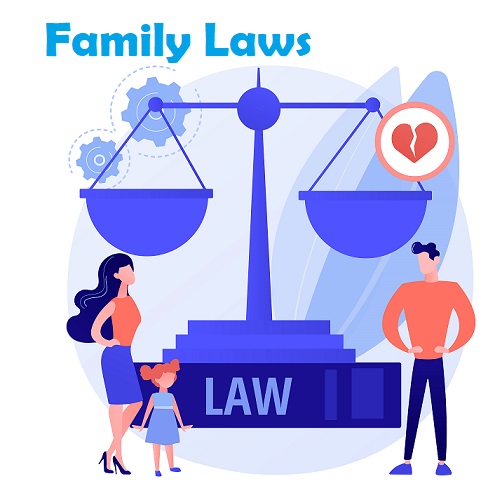Matrimonial law, commonly referred to as family laws or native relations law, is a branch of the law that deals with domestic and family matters, including adoption, divorce, child custody and support, and other issues. Family lawyer means a lawyer which provide legal aid in family matters.
I’m an attorney named Ijaz Ahmad Sandhu, and I’m creating this essay about family law to assist you with court-related family matters. I assure you that reading this essay will benefit you much.
You may learn more about Pakistani family laws here. In Pakistan, our team of family attorneys works with clients to find solutions to family law issues. Islamic law and English common law are the foundations of the legal system. While the latter is more significant in terms of personal standing, the former is more significant in terms of business law (and more recently, criminal and tax law to some extent).
The Muslim family law legislation that was implemented in British India continued to regulate personal status after India was partitioned in 1947. In order to assess the personal status rules that applied in the new state and identify any areas that need modification, a seven-member Commission on Marriage and Family Laws was created in 1955. The Commission issued its findings in 1956 and included many reform recommendations, such as the idea of treating all triple talaqs (apart from the third of the three) as a single, reversible repudiation.
Constitution of Pakistan:
The third Constitution was enacted on April 10th, 1973; it was suspended in 1977; it was reinstated in 1985; and throughout time, it underwent a number of revisions. It was again halted in 1999 and was still suspended as of this writing.
Islam is proclaimed the official religion of Pakistan in Article 2 of the Constitution, which also states that Pakistan will be known as “the Islamic Republic of Pakistan.” By inserting Article 2A in 1985, the Objectives Resolution in the Constitution’s preamble was transformed into a substantive provision, demanding that all legislation be brought into compliance with the Quran and Sunnah.
The Federal Shariat Court is established in Chapter 3A, and it is stated there that the Court will examine any legislation or legal provision that may be in conflict with the “injunctions of Islam, as given forth in the Holy Quran and the Sunnah.” The court must notify the federal or provincial government of its decision to find a statute or provision objectionable and provide its reasons.
If there is any doubt about the accuracy, legitimacy, or appropriateness of any finding, sentence, or order, or the orderly conduct of the proceedings, the Court may also review any judgments made by any criminal court on the application of the hudud penalty and may suspend the sentence.
The Federal Shariat Court’s rulings are subject to review by the Supreme Court’s Shariat Appellate Bench, which is composed of three Muslim Supreme Court justices and up to two ulama. Islamic Provisions, Part IX of the Constitution, reiterates that no laws should be passed that are incompatible with Islamic tenets and calls for the Islamization of all current legislation.
The phrase “Quran and Sunnah” refers to any sect’s rules as they are understood by that sect, according to an explanation attached to Part IX.
The Islamic requirements also call for the establishment of an Islamic Ideology Council, which the President would nominate from 8 to 20 members. They must have an “understanding of the economic, political, judicial, or administrative challenges of Pakistan, or knowledge of the principles and philosophy of Islam as enunciated in the Holy Quran and Sunnah.” As much as is practicable, the Islamic Council is intended to reflect a variety of schools of thought, and at least one woman should be nominated.
Its role is to provide advice to the Provincial Assemblies and Majlis-e-Shoora (Parliament) “as to the ways and means of enabling and encouraging the Muslims of Pakistan to order their lives individually and collectively in every respect in accordance with the principles and concepts of Islam as enunciated in the Holy Quran and Sunnah.” The Council gathers “such Injunctions of Islam as may be given legal effect” for the federal and provincial governments and judges whether new legislation is objectionable or not.
Must Read How to Become Lawyer in Pakistan
Relevant Acts:
- Child Marriage Restraint Act, 1929
- Muslim Family Laws Ordinance, 1961
- (West Pakistan) Muslim Personal Law (Sharia) Application Act, 1962
- Guardians and Wards Act, 1890
- The offense of Zina (Enforcement of Hudood) Ordinance, 1979
- (West Pakistan) Family Courts Act, 1964
- Enforcement of Sharia Act, 1991
- Law of Evidence (Qanun-e-Shahadat) Order, 1984
- Offense of Qazf (Enforcement of Hudood) Order, 1979
- Dowry and Bridal Gifts (Restriction) Act, 1976
- Execution of Punishment of Whipping Ordinance, 1979
- Prohibition (Enforcement of Hudood) Order, 1979
- Muslim Marriage Dissolution Act of 1939
the provincial laws on the application of Islamic law, as well as the Muslim Personal Law (Shariat) Application Act of 1937, were repealed. The new Act mandates that Muslim personal law be applied to all disputes involving personal status and succession in which the parties are Muslims, regardless of tradition or use.
The 1937 enactment took the opposite stance toward customary land law, and one specific provision of the new legislation states that “the limited estates in respect of immovable property held by Muslim females under the customary law are hereby terminated”; as a result, the new Act specifies that it will not apply retroactively.
Legal Age for marriage:
Males must be 18 years old and females must be 16 years old; underage weddings are punishable but are nonetheless legal.
Wali or Guardian for marriage:
The court in Abdul Waheed v. Asma Jehangir (PLD 1997 Lah 331) affirmed that, under present law, an adult Hanafi Muslim woman may contract herself into marriage without the approval of the wali since the woman’s assent, not the wali’s, is the necessary condition for the legitimacy of the contract.
Marriage Registration and Court Marriage:
Polygamy:
With the introduction of the requirement that the husband must submit an application and pay a fee to the local Union Council in order to get prior written authorization for forming a polygamous marriage, the MFLO also implemented some minor amendments to the legislation dealing with polygamy.
The application must include the justifications for the intended union as well as a statement about whether the intended spouses have given their approval. In order to ascertain if the proposed marriage is necessary, the chairman of the Union Council appoints an Arbitration Council composed of representatives of the applicant and the applicant’s wife or spouses.
A polygamous marriage cannot be registered under the MFLO if it is contracted without the Union Council’s approval. If a polygamous marriage is contracted without this permission, the husband must immediately pay the entire dower to the existing wife or wives in addition to being subject to a fine and/or imprisonment. However, a man’s second marriage is still legal if he doesn’t ask his current spouse or the Union Council for approval.
Additionally, the effectiveness of the reform measures is hampered by the difficulties in enforcing recourse to the Union Council application procedure and the judiciary’s resistance to applying the MFLO’s sanctions, as shown by case law. Due to this, some commentators have referred to the clauses needing the Arbitration Council’s consent as just formalities.
Polygamy is restricted by the need to apply for permission from the local Union Council and notify any existing wives. This restriction is backed by criminal penalties for entering into a polygamous marriage without permission; the fact that the husband entered into a polygamous marriage in violation of the law is enough for the first wife to obtain a decree of dissolution.
Must Read Ehsaas Act for Poors in Pakistan
Maintenance/ Obedience:
When a husband neglects to provide for his wife or wives or neglects to provide an equitable standard of maintenance for co-wives, the chairman of the Union Council will also appoint an Arbitration Council to decide the problem (at the application of one or more wives, and in addition to their seeking any other legal remedy).
Any unpaid dower or maintenance is recoverable as unpaid land revenue if it is not made on time. Additionally, the whole amount of the dower specified in the marriage contract is believed to be due as a prompt dower if no information about the method of mahr payment is provided in the contract.
Divorce(Talaq):
The formalization of reconciliation and notification procedures, as well as those for recovering mahr and penalties for non-compliance. In the 1960s and 1970s, failure to notify generally rendered talaq invalid. However, the introduction of the Zina Ordinance led to changes in judicial practice so that failure to notify does not render talaq invalid.
Additionally, efforts were made to modernize the traditional legislation as it pertains to the practice of talaq. According to the MFLO, the divorced spouse must submit written notification to the head of the Union Council as soon as practicable after a talaq has been declared “in any form whatsoever.” The wife must get a copy of the notification from the chairman.
Must Read Khula and Divorce Laws in Pakistan
Infractions are subject to fines and/or imprisonment. The chairman must set up an Arbitration Council within thirty days of receiving the notice of repudiation in order to start the process of resolving the dispute. If that doesn’t work, a talaq that isn’t canceled, either explicitly or implicitly, takes effect when ninety days have passed after the day the chairman received the notification of repudiation. If the wife is expecting a child at the time the talaq is announced, the pregnancy must have ended or ninety days have passed before the talaq becomes effective.
It is still against the law for a previous spouse who has dumped the same woman three times to remarry without first having a subsequent marriage. Up until the late 1970s and early 1980s, failure to notify rendered the talaq void. However, the advent of the Zina Ordinance opened the door for abuse since rejected spouses were left vulnerable to Zina accusations if their husbands had not followed the MFLO’s notification protocol.
As a result, since the early 1980s, court practice has recognized repudiations made in violation of the notice process as legal. When a marriage is dissolved otherwise than by talaq or by a delegated divorce (talaq al-tajwid), the notice and arbitration regulations apply mutatis mutandis and to the extent applicable.
Judicial Divorce:
Women may file for divorce on the following grounds: desertion for four years, failure to maintain for two years, or the husband entering into a polygamous marriage in violation of legal protocol; the husband’s imprisonment for seven years; the husband’s failure to fulfill marital obligations for three years; the husband’s continued impotence since the marriage; the husband’s insanity for two years; or the husband’s serious illness; or the wife exercising her right to puberty before the husband.
If the woman is ready to give up her pecuniary rights, judicial khula may also be given without the husband’s approval; the landmark case is Khurshid Bibi v. Md. Amin (PLD 1967 SC 97).
Must Read Transgender Bill in Pakistan
Khula in Muslim Personal Law:
The Arabic term for a woman’s ability to divorce in Islam is khula, which denotes her separation from her spouse. Following a divorce, the spouse is in charge of providing for the children’s upkeep and education. Up until Hizanat (In the case of a male minor child, the age of Hizanat is seven years.
The mother of a minor male child has had custodian rights for seven years. After that, the mother’s right to the custody of a minor son ends), which is seven years for boys and puberty for girls, and the kids stay with their mom.
The children have the right to remain with their parents after reaching Hizanat, and the court will take their viewpoint into consideration, but not as a final, binding decision.
While a guy wants a Talaq, a woman seeks a Khula. The husband and wife may reconcile during the Iddah time.
Dissolution of Marriage Act:
divorce is still governed in Pakistan. In the case of a male minor child, the age of Hizanat is seven years. The mother of a minor male child has had custodian rights for seven years. After that, the mother’s right to the custody of a minor son ends By amending the Act in accordance with the Muslim Family Laws Ordinance of 1961, a woman is now eligible for a judgment of divorce if she contracts a polygamous marriage in violation of the MFLO.
Another modification increases the age from 15 to 16 at which a woman must have been married by her father or another guardian in order to use her choice of puberty; as long as the marriage was not consummated, the option of puberty may be exercised even if the girl was married before the age of 16.
The “judicial khula” is a crucial aspect of Pakistani divorce law. Some people applaud it since it gives women the right to divorce without regard to their reasons, as long as they are willing to give up their financial rights (i.e., repaying her dower). Others reject it, pointing out that judges may decide in favor of a judicial khula in situations when women are obviously entitled to one under the DMMA’s conditions without sacrificing their pecuniary rights.
The Supreme Court was asked to rule in the case of Khurshid Bibi v. Mohd. Amin (PLD 1967 SC 97) on the following issue: “(Is) a wife, under Muslim law, entitled, as of right, to claim khula, despite the husband’s unwillingness to release her from the matrimonial tie, if she satisfies the Court that there is no possibility of their living together consistently with their conjugal duties and obligations?”
According to the Supreme Court, a Muslim woman has a legal right to khula if her husband denies her request and she can demonstrate to the Court that doing so would force her into an abusive marriage.
Post-Divorce Maintenance:
ruled by traditional law The traditional legislation is applied to maintenance during and after marriage. The Criminal Procedure Code of Pakistan does not reflect the post-independence amendments to the Indian Criminal Procedure Code that permit a divorced woman who is unable to support herself to seek maintenance from her former spouse.
While section 488 of the Criminal Procedure Codes of Pakistan and Bangladesh has not undergone the same modifications as the Indian Criminal Procedure Code, which was expanded to include divorce,
Child Custody:
The Guardians and Wards Act of 1890 states that the divorced wife is generally entitled to custody until the child reaches puberty for girls and 7 years for boys (the traditional Hanafi viewpoint), while there is some wiggle room since the best interests of the ward are prioritized.
Succession:
Classical law remains in effect, but post-independence legislation provided a change that allowed orphaned grandchildren via sons and daughters to receive the part that their father or mother would have been entitled to have they had not predeceased the grandparents.
Family Lawyer in Pakistan:
if you are looking for family lawyer in Lahore you can contact Valid Laws Team. We provide you best and experienced Family Lawyer because your family matters are private and confidential. Valid Laws administration watch its Lawyers start to end and and keep watch its clients.So you feel free to contact.
Family Lawyer in Lahore:
Lawyers with expertise from ValidLaws are also available in Lahore. Our Valid Laws Team works really hard and provides excellent family law services to humanity. So you can feel free to contact with us. We are not taking any consultation fees.






